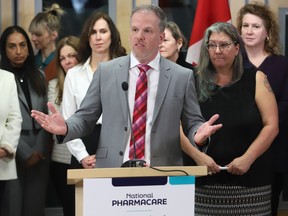Opinion: Amid Canada's mental health care crisis, it's time to prioritize universal access to medication
Opinion: First phase of proposed national pharmacare legislation doesn't include medicines for mental illness. Will Canadians living with mental illness continue to be marginalized in future phases?

Article content
In Canada, a country celebrated for its fair and universal health care system, a significant disparity exists today around the accessibility of medicines for mental illness. This inequity not only underscores a critical gap in our health care model, but it also highlights the need for an improved mental health approach in all Pan-Canadian initiatives, including future national universal pharmacare.
One in five Canadians experiences a mental illness each year. From debilitating anxiety disorders to life-threatening depression, the burden of mental illness weighs heavily on individuals, with a tsunami of effects on families, workplaces and the health care system. When the needs of people living with mental illness are overlooked or minimized, it perpetuates a cycle of suffering and economic loss, as untreated mental illnesses lead to increased health care costs and decreased productivity.
Despite the prevalence and the severe impact mental illness can have on individuals’ lives, access to necessary medications remains a substantial challenge for many. This obstacle is largely due to the variations in drug coverage across provincial health authorities and between those with and without private coverage, creating a patchwork of access that leaves many Canadians without the essential treatments they need. The inconsistency in drug coverage exacerbates the challenges faced by those living with mental illness, contributing to prolonged suffering and, in many cases, preventing recovery.
We are deeply troubled by inequitable access to mental illness medications as seen in the Mood Disorders Society of Canada’s System Broken: How Public Drug Coverage is Failing Candadians with Mental Illness. This report examined Canada’s public reimbursement review process for medications to treat mental illnesses that have been approved by Health Canada between 2012 and 2022. It revealed substantial delays, a significantly higher rate of negative reimbursement recommendations for medications that treat mental illness compared to other illnesses, and an inequality of publicly funded medications across Canada’s most populated provinces.
In February, Minister of Health Mark Holland said, “Each and every Canadian should have access to the prescription drugs they need.”
The first phase of the proposed national universal pharmacare legislation includes universal access to contraception and diabetes medications. Will the one in five Canadians currently living with mental illness continue to be marginalized and deprioritized in future phases? Mental health care and access to medications must be prioritized to address Canada’s current mental health care crisis.
Psychiatrists are committed to patient well-being, and we see firsthand the benefits of improving access to medications that treat mental illness. Enabling access acknowledges mental health as integral to overall health, breaking down the stigma that has long prevented individuals from seeking and receiving help — thus fostering a healthier population and, by extension, a more robust society.
From an economic perspective, investing in mental health care, including medication coverage, yields high returns by reducing hospitalizations, emergency room visits, and the need for more intensive, costly interventions down the line.
As Canada moves toward implementing a national universal pharmacare strategy, it is vital that the needs of individuals with mental illness are placed at the forefront of policy discussions. It is time for Canadian policymakers to prioritize the mental health of their citizens, acknowledging the profound impact that such a commitment can have on the lives of millions. The path toward a more inclusive, equitable health care system is clear; it is our collective responsibility to take this route.
Dr. Diane McIntosh is a community psychiatrist and clinical assistant professor at the University of British Columbia. Dr. Pierre Blier, MD, is a professor in the Department of Psychiatry and Cellular/Molecular Medicine at the University of Ottawa.
Bookmark our website and support our journalism: Don’t miss the news you need to know — add VancouverSun.com and TheProvince.com to your bookmarks and sign up for our newsletters here.
You can also support our journalism by becoming a digital subscriber: For just $14 a month, you can get unlimited access to The Vancouver Sun, The Province, National Post and 13 other Canadian news sites. Support us by subscribing today: The Vancouver Sun | The Province.

![NORTH VANCOUVER, BC., February 13, 2024 - The Carlile Youth Concurrent Disorders Centre which is closing due a shortage of staff, in North Vancouver, B.C., on February 13, 2024. (NICK PROCAYLO/POSTMEDIA) 10103832A [PNG Merlin Archive]](https://smartcdn.gprod.postmedia.digital/theprovince/wp-content/uploads/2024/02/png0213nhospital-01-1.jpg?h=96&strip=all&quality=80&sig=cdySLyJpvVZ9lkowBdXyFw)





Postmedia is committed to maintaining a lively but civil forum for discussion. Please keep comments relevant and respectful. Comments may take up to an hour to appear on the site. You will receive an email if there is a reply to your comment, an update to a thread you follow or if a user you follow comments. Visit our Community Guidelines for more information.